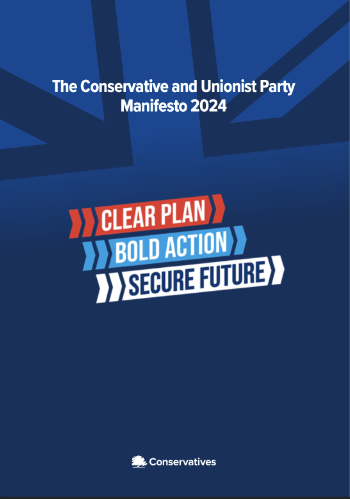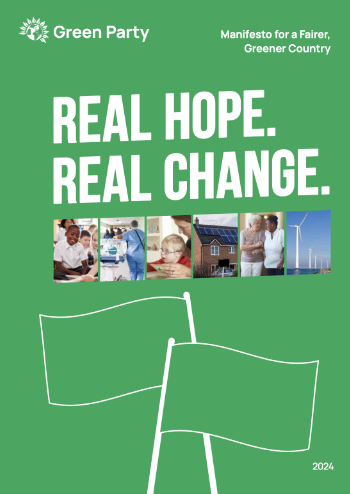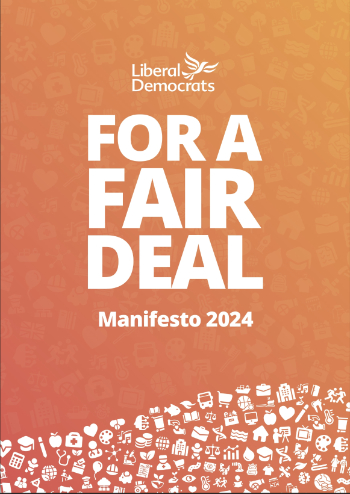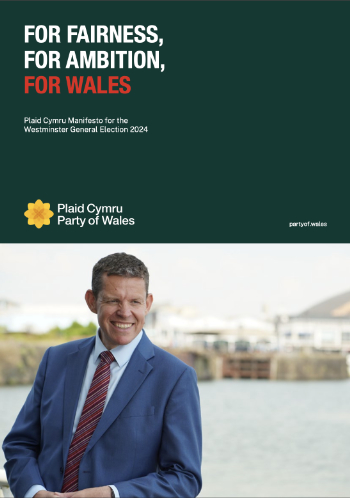Political party manifestos, design, construction and a last look
At the beginning of June Designing Buildings published 'the construction industry ramps up for the general election' outlining the various campaigns, charters, manifestos, focus area discussions and comments from a variety of built environment related organisations.
Now, with the election imminent here is a last look at what the various parties are offering in relation to the design, construction, support for and lessening of and the impact of the built environment. The article is based on the manifestos themselves as well as a variety of other external links, in alphabetical order, highlighting a number of topics:
| New housing and retrofit | Net zero and energy supply |
| Nature and biodiversity | Training and business support |
| SME and business support | Planning and building safety |
This article is aims to be as impartial as possible and is based on the variety of sources as listed, it should not be used as the only basis for voting but along with the individual party manifestos (links also provided).
Contents |
[edit] The Conservative Party manifesto
|
The conservative party manifesto |

|
[edit] New housing and retrofit
Plan to deliver 1.6 million homes in the next Parliament. Fast-track planning for homes on brownfield land in the 20 biggest cities and look at extending ‘full expensing’ to the delivery of brownfield housing. Infrastructure Levy funds for local infrastructure needs to support those homes, making planning simpler and supporting self-build, commission, and community housing schemes.
Design codes to enable gentle densification of urban areas, built in the local character. Encouraging different forms of housing, such as for older people. Commitment to mandatory housebuilding targets (320,000 per annum) and alterations to the Stamp Duty system (abolishing Stamp Duty for homes up to £425,000 for first-time buyers).
A Renters Reform Bill for “landlords and renters alike” with court reforms promised to abolish Section 21 evictions.
Invest £6 billion in energy efficiency over the next three years to make around a million homes warmer. Fund an energy efficiency voucher scheme, open to every household in England, to support the installation of energy efficiency measures and solar panels.
[edit] Net zero and energy supply
An agreement for net zero by 2050. Treble offshore wind capacity and find the right balance between energy security and the views of local communities for onshore wind, with direct benefits to local areas such as bill reductions. Facilitate brownfield and rooftop solar in the “right places, not on our best agricultural land.”.
Annual licensing and maintaining incentives for North Sea oil and gas production with a new gas power station moratorium on fracking and retaining the windfall tax to remain until 2028–29, subject to earlier price falls. Approve two new fleets of small modular reactors and work to deliver Wylfa nuclear power stations, Hinkley Point, and Sizewell sites. Cut grid connection waiting times to deliver an estimated saving of £15–£25 per household per year by 2035.
[edit] Nature and biodiversity
Plan to abolish the nutrient neutrality rules, which require new housing developments not to add more nutrient pollution to the water catchment, making developers legally required to pay a one-off mitigation fee so there is no net additional pollution.
To deliver tree planting and peatland commitments, work to unlock private investment, cut planning red tape for tree planting, introduce forest risk commodities legislation, and tackle the UK’s impact on illegal deforestation internationally (as per COP28). Designate an 11th National Park alongside investing to improve existing National Parks and protected landscapes.
Fines from water companies are to be used to invest in river restoration projects and future rounds of the Landscape Recovery Scheme to support more local projects. Continue to support programmes that encourage disadvantaged children and young people to access green spaces.
Deliver on commitments on national trails and work with landowners, charities, and others to open up more ‘access to nature’ routes, but there will not be a universal right to roam.
To further international marine protections, consult with the UK Overseas Territories to expand the Blue Belt programme, continue the moratorium on deep-sea mining, and ratify the Global Oceans Treaty.
[edit] Training and business support
Focus on improving vocational training and apprenticeships; promise to fund 100,000 apprenticeships for young people by closing university courses with the worst outcomes and providing new police officers, nurses, and doctors.
A commitment to a loan scheme called “Lifelong Learning Entitlement," which facilitates adults looking to retrain or upskill, from the 2025 academic year for the purpose of covering the cost of new qualifications. Also planning to rebuild and refurbish over 500 schools in relation to RAAC.
[edit] Planning and building safety
Deliver homes on brownfield land in urban areas by providing a fast-track route through the planning system for new homes on previously developed land in the 20 largest cities. Design codes to ensure gentle densification of urban areas, with new family homes and mansion blocks on tree-lined streets built in the local character. Looking at extending ‘full expensing’ to the delivery of brownfield housing.
Unlocking new urban regeneration schemes by creating locally-led urban development corporations in partnership with the private sector and institutional investors. Supporting the delivery of new quarters in Leeds, Liverpool, and York, and working with local leaders and the community to seize the opportunity of the ambitious Cambridge 2050 plan. Supporting local and smaller builders by requiring councils to set land aside for them and lifting Section 106 burdens on smaller sites while ruling out Labour’s proposed ‘community right to appeal’ which would bring the planning system to its knees.
Making sure local authorities use the new infrastructure levy to deliver the GP surgeries, roads, and other local infrastructure needed to support homes. Not allowing these funds to be spent on community projects that bear no relation to support for new homes.
'After delivering landmark new laws that freed leaseholders from cladding bills following on from the awful tragedy of Grenfell Tower, we will continue our support for leaseholders affected by historic building safety problems by requiring the continuation of developer-funded remediation programmes for mid- and high-rise buildings.'
'We will back Ofsted to provide clear judgements to parents on the quality and safety of schools. We are rebuilding over 500 schools through the School Rebuilding Programme, including rebuilding or refurbishing every school identified to have RAAC.'
Retaining commitment to protect the Green Belt from uncontrolled development while ensuring more homes get built where it makes sense, like in inner cities, Our national planning protections mean there is never any top-down requirement for councils to remove Green Belt protection, and these will remain in place.'
[edit] The Green Party manifesto
|
The green party manifesto |

|
[edit] New housing and retrofit
150,000 new social homes through new build and refurbishment. All new developments accompanied by investment needed in local health, transport, and other services. Local authorities allocated resources needed to exercise placemaking and placeshaping role. Push for planning decisions to be informed by a land use planning policy framework and an end to individual ‘right to buy’, to keep social homes for local communities in perpetuity.
Set viability levels for development in each area’s Local Plan, with no negotiation with developers. Push for homeowners to easily access property-linked finance. Ensure all new homes meet Passivhaus or equivalent standards and house builders required to include solar panels and low-carbon heating systems such as heat pumps, with the Minimum Energy Efficiency Standard becoming ‘EPC C’. All planning applications to include whole- life carbon and energy calculations.
Introduce rent controls, stable rental tenancies and an end to no-fault evictions, with a tenants right to demand energy efficiency improvements. Push for a local authority-led model, street-by-street retrofit programme to insulate homes, provide clean heat and start to adapt buildings to more extreme climate conditions. £29 billion over next five years invested to insulate homes to an EPC B standard or above, £4 billion to insulate other buildings to a high standard and £9 billion for low-carbon heating systems for homes and other buildings.
[edit] Net zero and energy supply
Zero carbon society as soon as possible “more than a decade ahead of 2050”. Offshore Wind to be 80 GW by 2035, with ports and supply chains to better support floating offshore wind. Onshore Wind to be 53 GW and Solar 100 GW by 2035 with solar panels “mandated” on all new homes.
New fossil fuel extraction, oil and gas licences and subsidies stopped, with recent fossil fuel licences also halted.
Close profit loopholes, increase windfall tax on oil and gas production and new windfall tax on certain banks. Cease new nuclear developments and phase out nuclear energy. Significantly expand and improve grid efficiency, increase capacity and invest in interconnectors and grid storage.
[edit] Nature and biodiversity
Introduce a Rights of Nature Act giving legal personhood to nature. Set aside 30% of our land and seas by 2030 in which nature will receive the highest priority and protection. Seek to strengthen and prevent any rollback of existing protections of the Green Belt, National Landscapes, and Sites of Special Scientific Interest. Push to restore rivers and take a nature-based solutions approach to the prevention of flooding and storm overflows.
Increase DEFRA’s budget by £1.5bn, allowing an increase in funding for the Environment Agency and Natural England. This would include developing a soil health monitoring programme for England, to match those in Scotland and Wales. Grants of an additional £3bn annually will be made available to landowners and farmers by the middle of the next parliament to support returning land to nature, with generous per hectare payments.
Introducing a new Right to Roam Act for England, that would enable people to access green space close to where they live and be a first step to resetting our relationship with the natural world. Campaign to ensure that everybody lives within 15 minutes’ walking distance of a nature-rich green space. We will ensure car-free access to the National Parks with new cycling, walking, wheeling and bus links.
Champion reintroducing nature into urban environments, with investment in schemes such as street planting of native trees, compulsory hedgehog holes in all new fencing, swift bricks and bee corridors. And we will prioritise training of conservation workers and developing a public service professional path for nature conservation.
Introduce a ban on all hunting in the first year of a new parliament. This includes trophy hunting, trail hunting, where dogs are used to track foxes, and the commercial shooting of game birds. Government subsidies will no longer be given to maintain artificial landscapes designed only for hunting (such as grouse moors). Campaign against badger culling, and invest in better farm biosecurity and badger vaccination. Where necessary for ecological reasons, or for animals described as pests, humane culling will be licensed by Natural England and carried out by trained professionals, along with banning the use of lead ammunition and outlaw all forms of snaring.
Ensure that all British domestic and overseas territorial waters offer the highest protection to marine mammals, sea birds and marine life. Champion co-operation in achieving global sanctuary for all cetaceans, alongside active support for UN Charters and obligations under The Law of the Sea to protect against overfishing, pollution, climate impacts and other threats. Push for a ban on bottom trawling and other destructive fishing practices in Marine Protected Areas and other waters, as well as for proper implementation and enforcement of relevant international legislation to protect deep sea species.
[edit] Training and business support
Highlighting the need for training programmes to give workers with skills in retrofitting and green technologies, pledging £4 billion towards these. Prioritise training of conservation workers and developing a public service professional path for nature conservation.
The world of work is changing fast. Fewer young people will experience only one career and workplace in their lives. Education and training must be accessible, and better designed to support lifelong learning.
Offer sustainable employment, decent livelihoods, career opportunities, good working conditions and ongoing training to those involved in growing food.
Small and medium-sized business are the lifeblood of our economy and our communities. We want to see them supported to play a key role in the green economy of the future, and to create new, quality jobs and training opportunities.
Green MPs will back the setting up of regional mutual banks to drive investment in decarbonisation and local economic sustainability by supporting investment in SMEs and community-owned enterprises and cooperatives.
[edit] Planning and Building safety
'To enhance the role of local authorities, elected Greens will push for local decisions about planning to be informed by a land use planning policy framework that seeks to balance various needs, such as to meet the challenge of the climate emergency, protect nature, grow enough food, and provide homes and energy.'
'Each area’s local plan will set viability levels for development and there will be no subsequent negotiation with developers. And Greens will take back the power of building control from developers and invest in publicly accountable building inspectors and building control officers. We cannot allow the continued provision of dangerous and substandard homes.'
[edit] The Labour Party manifesto
|
The labour party manifesto |

|
[edit] New housing and retrofit
Build 1.5 million homes over the next parliament, restore national housing targets in planning. Brownfield-first
approach to development, releasing ‘grey belt’ land for new homes. Increase social and affordable housing supply
through planning. Help councils and housing associations to build to their capacity and steps to ensure building more high-quality, well-designed, and sustainable homes and creating places.
£6.6 billion to upgrade five million homes. Grants and low interest loans insulation and other improvements, and partner
with combined authorities, local and devolved governments, to roll out this plan. Work with the private sector
to provide further private finance to accelerate home upgrades and low carbon heating.
Introduce a permanent, comprehensive mortgage guarantee scheme for first time buyers and immediately abolish Section 21 ‘no fault’ evictions.
[edit] Net zero and energy supply
National Mission for clean power by 2030, via the formation of a publicly owned energy company. Mandate credible transition plans aligning with the Paris Agreement’s 1.5°C goal for financial institutions and FTSE 100.
Quadruple offshore and double onshore wind capacity by 2030, and triple solar capacity. “rewire Britain” to upgrade national transmission infrastructure.
Maintain “strategic reserve” of gas power stations, recognise “ongoing role” of oil and gas. No new exploration or coal licences but existing North Sea licences continue. Fracking banned, “close loopholes” in windfall tax on oil and gas. Extend lifetime of existing plants, Hinkley Point C, new nuclear, such as Sizewell C and SMRs to “play an important role”.
A spending commitment of £23.7bn for green initiatives during the next parliament and restoring plans to ban the sale of new petrol and diesel cars from 2030.
[edit] Nature and biodiversity
Labour recognise the climate and nature crisis as “the greatest long-term global challenge that we face“, but focus mostly on the energy transition in this respect. They add that they will “work in partnership with civil society, communities and business to restore and protect our natural world”.
“As part of [their] plans to improve responsible access to nature, Labour will create nine new National River Walks, one in each region of England, and establish three new National Forests in England, whilst planting millions of trees and creating new woodlands. Labour will expand nature-rich habitats such as wetlands, peat bogs and forests so families can explore and wildlife can thrive, including on public land. Labour is committed to reducing waste by moving to a circular economy.”
In supporting British farmers, Labour recognises that food security is national security, wanting to champion British farming whilst protecting the environment. They want half of all food purchased across the public sector to be locally produced or certified to higher environmental standards.
Labour will introduce a land-use framework and make environment land management schemes work for farmers and nature, and work with farmers and scientists on measures to eradicate Bovine TB in order to end the “ineffective” badger cull.
[edit] Training and business support
Strengthen the Migration Advisory Committee, and establish a framework for joint working with skills bodies across the UK, the Industrial Strategy Council and the Department for Work and Pensions. Ending the long-term reliance on overseas workers in some parts of the economy by bringing in workforce and training plans for sectors such as health and social care, and construction.
Plans to liberalise the apprenticeship levy, so it can be spent on a wider range of training courses and promises a ‘workforce and training plan’ for the construction sector. On skills, the Labour Party manifesto introduces a new body, “Skills England”, which would bring together a variety of different voices at a national and local level to ensure that there is the highly trained workforce needed to deliver their industrial strategy. Part of the generation of this workforce would include reforming the apprenticeship levy, reforming the point-based immigration system and transforming Further Education colleges into Specialist Technical Excellence Colleges.
[edit] Planning and Building safety
'Labour will also take decisive action to improve building safety, including through regulation, to ensure we never again see a repeat of the Grenfell fire. We will review how to better protect leaseholders from costs and take steps to accelerate the pace of remediation across the country. We will put a renewed focus on ensuring those responsible for the building safety crisis pay to put it right.'
[edit] The Liberal Democrats manifesto
|
The liberal democrat party manifesto |

|
[edit] New housing and retrofit
A target of 380,000 homes per year across the UK, including 150,000 social homes, including 10 garden cities.
Financial incentives for brownfield development and ‘use it or lose it’ planning permissions for developers who refuse to build. They would give local authorities the powers to end Right to Buy scheme, abolishing residential leaseholds and capping ground rents to a nominal fee.
Expand Neighbourhood Planning, trial Community Land Auctions to fund local services and encourage the use of rural exception sites. A ban no-fault evictions, making three-year tenancies the default, and creating a national register of licensed landlords
Aim for 90% of electricity from renewables by 2030. Require all large UK stock-exchange listed companies to set targets consistent with net zero goal. Onshore offshore wind and solar. Remove unnecessary restrictions on new solar to drive a rooftop solar revolution. onshore wind and solar r
Push for all OECD countries to agree to end subsidies for foreign fossil fuel projects, implement G7 pledge to end fossil fuel subsidies, maintain fracking ban and new ban on coal mines.
Build the grid infrastructure required, more electricity interconnection between the UK and other countries, reduce grid connection access costs; and reform network to permit “local energy grids”.
[edit] Nature and biodiversity
Set meaningful and binding targets to stop the decline of our natural environment and ‘double nature’ by 2050: doubling the size of the Protected Area Network, doubling the area of most important wildlife habitats, doubling the abundance of species and doubling woodland cover by 2050.
Plant at least 60 million trees a year, helping to restore woodland habitats, increase the use of sustainable wood in construction, and reach net zero. Strengthen the Office for Environmental Protection and provide more funding to the Environment Agency and Natural England to help protect our environment and enforce environmental laws.
Improving the quantity and quality of bathing waters and sensitive nature sites with more regular and robust testing of water quality. Working together with our European neighbours to tackle the nature crisis, including applying to join the European Environment Agency.
Significantly increasing the amount of accessible green space, including protecting up to a million acres, completing the coastal path, exploring a ‘right to roam’ for waterways and creating a new designation of National Nature Park Passing a new Environmental Rights Act, recognising everyone’s human right to a healthy environment and guaranteeing access to environmental justice. Protecting at least 30% of land and sea areas by 2030 for nature’s recovery
Hold businesses to account for their responsibility to the environment by introducing a general duty of care for the environment, requiring large businesses to publish transition plans to become nature-positive across their activities and supply chains. And introducing nature-related financial disclosure requirements for large businesses.
Ensuring new developments result in significant net gain for biodiversity, with up to a 100% net gain for large developments. Introducing a strategic Land and Sea Use Framework to effectively balance competing demands on our land and oceans. Empowering Local Nature Recovery Strategies to identify a new Wild Belt for nature’s recovery.
Create a nature-positive economy by working to protect 30% of the world’s oceans by 2030 through the UN High Seas Treaty and finalising a Global Plastics Treaty to cut plastic pollution worldwide. Ensure that nature-based solutions form a critical part of our strategy to tackle climate change.
Restoring peatlands as a carbon store, and banning the use of horticultural peat and the routine burning of heather on peatlands. Protecting and enhancing our temperate rainforest.
Creating and restoring habitats like saltmarshes, mudflats and seagrass meadows to guard against coastal flooding and erosion and absorb carbon emissions. Working with international partners to fight deforestation around the world. Creating a real network of marine protected areas, ensuring that they are fully protected from damaging and destructive activities, protecting and restoring blue carbon and ensuring climate resilience at sea.
[edit] Training and business support
On the built environment, the Liberal Democrats manifesto focusses heavily on generating new skilled workers to fill gaps in crucial industries such as construction. Make planning work to the natural environment, Invest in skills and training for the green economy.
Within the manifesto, the party commits to fixing the skills and recruitment crisis by replacing the “broken” apprenticeship levy with a broader and more flexible skills and training levy. The Liberal Democrats also commit to creating new “Lifelong Skills Grants” which would give all adults in the UK £5,000 to spend on education and training throughout their lives, with an aim to increase the funding to £10,000 when public finances allow.
[edit] Planning and Building safety
Expand Neighbourhood Planning across England. Building ten new garden cities. Allowing councils to buy land for housing based on current use value rather than on a hope-value basis by reforming the Land Compensation Act 1961.
Properly funding local planning departments to improve planning outcomes and ensure housing is not built in areas of high flood risk without adequate mitigation, by allowing local authorities to set their own fees.
Encouraging the use of rural exception sites to expand rural housing. Trialling Community Land Auctions to ensure that local communities receive a fair share of the benefits of new development in their areas and to help fund vital local services.
Encouraging development of existing brownfield sites with financial incentives and ensuring that affordable and social housing is included in these projects. Introducing ‘use-it-or-lose-it’ planning permission for developers who refuse to build.
Ensure that all development has appropriate infrastructure, services and amenities in place, integrating infrastructure and public service delivery into the planning process.
'Remove dangerous cladding from all buildings, while ensuring that leaseholders do not have to pay a penny towards it.'
[edit] Plaid Cymru manifesto
|
The plaid cymru party manifesto |

|
[edit] New housing and retrofit
Long-term plan for retrofitting existing properties that would make them more energy efficient, thereby reducing costs and carbon emissions.
The ‘Unnos’ policy aims to support the Welsh construction industry as part of the proposals, creating centres of excellence in both new construction and retrofitting existing housing stock.
One of the challenges is tackling long-term empty or unused property that could be someone’s home. Plaid Cymru’s campaigning has helped increase council tax premiums on empty properties, which have funded grants to increase the supply of affordable homes. There is no good reason why so many properties are left empty when they could be housing individuals and families.
[edit] Net zero and energy supply
Deliver net zero in Wales by 2035. Supporting renewables but avoiding endangered species habitats or large industrial solar farms that lead to landscape destruction.
Opposed to new oil and gas licences, new open cast coal mines and new nuclear sites. Increases windfall tax on oil and gas production, closing existing loopholes and maintain fracking ban.
A push for changes to the structure of grid allowing communities to benefit more directly, whilst implementing alternative methods to link renewables to the grid, such as undergrounding of cables.
[edit] Nature and biodiversity
Plaid Cymru recognises that the climate and nature emergencies are “the biggest threat to mankind globally“, and says that we need to think beyond economic growth in terms of GDP, adding that they will “call on the next UK Government to consider adopting alternative ways of measuring the economy”.
Unsurprisingly, they want full control over natural resources in Wales, maintain the ban on fracking, improve enforcement of protections for SSSIs, support a science-led plan aligned with the 2022 Kunming-Montreal agreement to ensure that nature loss is firmly in reverse as soon as possible.
Plaid Cymru supports the introduction of biodiversity targets, to halt biodiversity decline by 2030, and ensure substantive recovery by 2050. Plaid would ensure that planning projects have to have regard to the two emergencies, to avoid situations like wind farms being built on landscapes that provide habitats for endangered species
[edit] Training and business support
‘Unnos’ policy aims to support the Welsh construction industry as part of our proposals, creating centres of excellence in both new construction and retrofitting existing housing stock. Working with local authorities and housing associations to further develop Welsh local supply chains and skilled labour, so that the profits from the Welsh house-building industry can be kept within Wales, rather than exported by the large ‘volume’ housebuilders.
They call on the next UK government to invest in green jobs and skills.
[edit] Planning and Building safety
Plans to Incentivise innovation to speed up and improve the quality of building, for example via the use of modular construction, digital technology etc.
See also Building safety in Building_safety_in_Scotland [1]Wales
[edit] Reform UK
|
The reform UK party manifesto |

|
[edit] New housing and retrofit
Fast-track planning and tax incentives for development of brownfield sites. ‘Loose fit planning’ policy for large residential developments with pre- approved guidelines and developer requirements.
The tax system should encourage smaller landlords into the rental markets. Not penalise them. We will restore landlords’ rights to deduct finance costs and mortgage interest from tax on rental income.
Existing legislation was inadequate to address bad practices. Instead, we will boost the monitoring, appeals and enforcement process for renters with grievances.
Protection for Leaseholders
All potential charges for leasehold or freehold residents must be clearly stated and consented to. Enforce Section 106 agreements. Ensure it is cheaper and easier to extend leases to 990 years and buy freeholds.
Incentivise Use of New Construction Technology
We will incentivise innovation to speed up building: modular construction, digital technology and building sites that improve efficiency and cut waste.
[edit] Net zero and energy supply
Intention to scrap net zero to “save the public sector over £30bn per year for the next 25 years” and “annual £10bn” of renewable energy subsidies.
Fast-tracking of new North Sea oil and gas licences as well as nuclear energy with new SMRs. Granting shale gas licences on test sites for two years, increasing combined cycle gas turbines, supported by “clean” synthetic fuel and “clean” coal mining.
[edit] Nature and biodiversity
Intention to scrap all EU-derived laws including the Habitats Regulations, curtail Natural England’s powers, and scrap “many dozens” of “unaccountable” government bodies.
The party says that tree-planting, more recycling, and reducing single use plastics will protect the environment.
As mentioned above proposals are to scrap climate targets, fast track North Sea oil and gas licences, pilot fracking, and remove environmental farming incentives.
[edit] Training and business support
On skills, Reform UK will look to increase the number of ‘homegrown’ qualified traders by increasing the number of new apprentices and vocational courses. The Reform UK contract specifically lists construction as one of the focus sectors for increasing technical courses and apprenticeships.
Alongside this, the construction sector gets a mention in relation to the use of new technologies in key industries. In this instance, Reform UK would like to see incentives put in place for new technologies such as modular construction and smart infrastructure.
[edit] Planning and Building safety
Tax incentives and fast-track planning for brownfield sites and ‘loose fit planning’ policy for large residential developments. Restore landlords’ rights to deduct finance costs and mortgage interest from tax on rental income, alongside not progressing the Renters’ (Reform) Bill. Instead, they will boost the monitoring, appeals and enforcement process for renters with grievances.
[edit] Scottish National Party manifesto
|
The Scottish National party manifesto |

|
[edit] New housing and retrofit
Scrap the cruel bedroom tax which punishes people claiming Universal Credit or housing benefit if they have a spare room in their rented council or housing association home. Devolve Housing Benefit and Local Housing Allowance which will allow the Scottish Government to take an innovative approach to tackle child poverty, expand the delivery of social housing and to help fund and encourage investment in house building.
Tackle the housing emergency caused by decades of Westminster underinvestment, a hard Brexit and a £1.3bn cut to the Scottish Government’s capital budget from the UK Government. The UK Government must restore the cut to our Capital Budget.
Scotland has invested in key infrastructure projects like the Borders Railway and the Queensferry crossing and delivered over 128,000 affordable homes, but without a change in approach to fiscal rules we are reaching the limits of what can be done. The SNP is calling on the UK Government to scrap their fiscal rules and introduce new ones to allow greater investment in renewing infrastructure and services. The UK Government must abandon the current trajectory and recognise the value of investing in national infrastructure.
[edit] Net zero and energy supply
UK government must invest at least £28bn a year in the green economy to deliver a step change in public and private investment in net zero and major investment in the domestic supply chain. As part of this investment, the UK government should seek an equity stake in future energy projects. Establish a Four Nations Climate Response Group to agree climate plans across the UK that deliver on net zero targets and ensure no backtracking on climate ambitions. Scotland must achieve net zero by 2045 for a chance that the whole of UK to reaches net zero by 2050.
Approach to modernise the contracts for difference scheme to enable the stable deployment of primarily offshore wind renewable energy pipeline.
Ban new coal licences and no new nuclear power plants in Scotland. Devolution of windfall taxation for companies operating in Scotland. An evidence-based approach to oil and gas, based on a rigorously evidence-led, case-by-case basis, through a robust climate compatibility assessment and further extraction to be consistent with climate obligations and energy security considerations.
Promote a fair and affordable transition to zero-emission transport fuels and ban the import and sale of new, non-zero-emission buses by 2025. Support the energy transition as North Sea oil and gas declines with £500m North-East Transition Fund – to be matched by UK government.
Looking towards independence and Scotland within the EU, making changes to the electricity grid system reducing fees for Scottish producers to connect supporting growth.
[edit] Nature and biodiversity
The twin crises of climate change and nature loss is acknowledged, with e a broad range of environmental pledges, but relating to nature. More investment in “sustainable” farming, is indicated and greater contributions to the global Loss and Damage Fund, recognising that those countries bearing the brunt of climate change impacts are also the countries that have contributed the least to carbon emissions.
Expand the delivery of social housing by devolving Housing Benefit and Local Housing Allowance and scrapping the bedroom tax.
[edit] Training and business support
Aims to address skills shortages with targeted training programmes in green and digital technologies. Mitigate the harm of Brexit on productivity by reviewing immigration rules and expanding shortage occupation lists, so businesses have access to the workforce they need.
'The future of the Grangemouth complex must be secured and a just transition delivered for the workforce. The UK Government must recognise the importance of the whole site to Scotland’s economy and communities and must invest in a sustainable future. Time is needed to unlock the significant opportunities for green industries of the future and it is important that the skilled workforce is retained, by extending refining for as long as possible, while that happens. Only in this way, can as many jobs as possible be protected and the transition made to working on the new, greener technologies that offer a long-term future for the site..'
[edit] Planning and Building safety
'Devolution allows the SNP very few mechanisms, via the planning system, to deliver increases in community benefit. Therefore, it is vital that the UK Government devolve the powers to Scotland so that wherever there is a significant investment, it can ensure communities feel the benefit.
With full powers, changes could be made to the electricity grid system that currently holds back the development of renewable energy in Scotland, including reducing fees for Scottish producers to connect. Until those powers are given, it is crucial that the UK government step up.
The SNP will introduce a Reinforced Autoclaved Aerated Concrete (a.k.a. RAAC) Remediation Fund for public sector buildings. Expand the delivery of social housing by devolving Housing Benefit and Local Housing Allowance and scrapping the bedroom tax.'
See also Building safety in Scotland
[edit] Related articles on Designing Buildings
- Does the Autumn Statement fire the starting pistol for an election campaign?
- Chancellor's 2022 Autumn statement industry response..
- Industry responds as Rishi Sunak becomes new PM.
- The Edge policy proposals for the built and natural environment 2022.
- The general election and why a shortage of electrical apprentices matters.
- The construction industry ramps up for the general election.
[edit] External links
- https://public.conservatives.com/static/documents/GE2024/Conservative-Manifesto-GE2024.pdf
- https://greenparty.org.uk/about/our-manifesto/2024-manifesto-downloads/
- https://labour.org.uk/change/
- https://www.libdems.org.uk/manifesto
- https://www.partyof.wales/manifesto
- https://www.reformparty.uk/
- https://www.snp.org/manifesto/
- https://www.ciob.org/industry/politics-government/campaigns/UK-General-Election/what-UK-election-manifestos-mean-built-environment
- https://cieem.net/what-are-the-political-parties-offering-for-nature/
- https://www.ucem.ac.uk/whats-happening/articles/what-does-uk-election-mean-for-built-environment/
- https://www.pbctoday.co.uk/news/planning-construction-news/general-election-2024-what-each-party-promise-means-for-uk-construction/140517/
- https://www.architecture.com/knowledge-and-resources/resources-landing-page/general-election-2024-manifestos-fact-sheet
Featured articles and news
A case study and a warning to would-be developers
Creating four dwellings... after half a century of doing this job, why, oh why, is it so difficult?
Reform of the fire engineering profession
Fire Engineers Advisory Panel: Authoritative Statement, reactions and next steps.
Restoration and renewal of the Palace of Westminster
A complex project of cultural significance from full decant to EMI, opportunities and a potential a way forward.
Apprenticeships and the responsibility we share
Perspectives from the CIOB President as National Apprentice Week comes to a close.
The first line of defence against rain, wind and snow.
Building Safety recap January, 2026
What we missed at the end of last year, and at the start of this...
National Apprenticeship Week 2026, 9-15 Feb
Shining a light on the positive impacts for businesses, their apprentices and the wider economy alike.
Applications and benefits of acoustic flooring
From commercial to retail.
From solid to sprung and ribbed to raised.
Strengthening industry collaboration in Hong Kong
Hong Kong Institute of Construction and The Chartered Institute of Building sign Memorandum of Understanding.
A detailed description from the experts at Cornish Lime.
IHBC planning for growth with corporate plan development
Grow with the Institute by volunteering and CP25 consultation.
Connecting ambition and action for designers and specifiers.
Electrical skills gap deepens as apprenticeship starts fall despite surging demand says ECA.
Built environment bodies deepen joint action on EDI
B.E.Inclusive initiative agree next phase of joint equity, diversity and inclusion (EDI) action plan.
Recognising culture as key to sustainable economic growth
Creative UK Provocation paper: Culture as Growth Infrastructure.





























